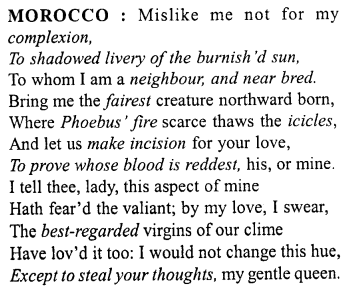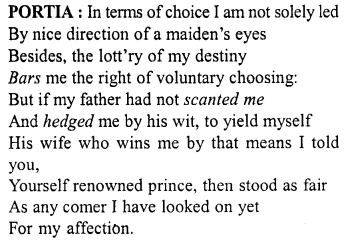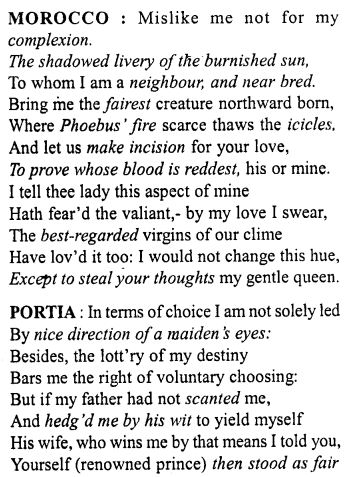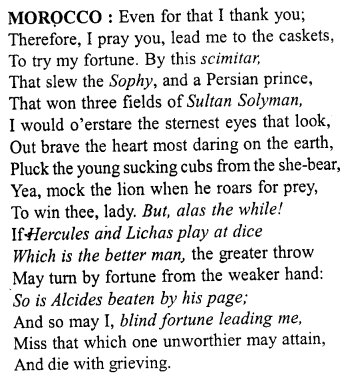Merchant Of Venice Act 2 Scene 1 Questions And Answers
ICSE SolutionsSelina ICSE SolutionsML Aggarwal Solutions
EnglishMathsPhysicsChemistryBiology
Act 2 Scene 1 Merchant Of Venice Workbook Important Questions and Answers
Passage – 1 (Act II Sc. I Lines 1 to 12)

Paraphrase :
MOROCCO : Don’t dislike me for my complexion, The dark clothing of the polished sun, To whom I am a neighbor, and born near it. Bring me the fairest creature born in the north, Where the sun’s fire hardly thaws the icicles, And let’s make a cut for your love To prove whose blood is reddest, his or mine. I tell you, lady, this face of mine Has feared the valiant; by my love, I swear The best-regarded virgins of my country Have loved it too. I would not change this color, Except to steal your thoughts, my gentle queen.
Word Meaning With Annotation
Complexion : colour. To shadowed livery of the burnish’d sun : “The dark colour which the fierce sun bestows.” “livery” is the uniform which a rich man uses for all his servants. Hence a “shadowy” or sun burnt skin is said to be the distinctive uniform or dress which the sun bestows on those who live in hot countries, neighbour : and near bred, the hot countries are near to the sun, and hence may be regarded as closer neighbours to it than cold countries, “near bred” may be read as “closely allied.” fairest: whitest; of lightest skin. Phoebus’ fire : “the heat of the sun”. Phoebus is the Greek name for the sun-god. icicles : long pointed spikes of ice. make incision : the old surgical term for the opening of a “vein. To prove whose blood is reddest : the old idea was that the most courageous man had reddest blood. The blood of a coward was always supposed to be of a pale colour, best regarded : “most respected.” Except to steal your thoughts : “unless it were to attract your thoughts of love.”
Read the above passage and answer the following questions
Question 1.
What justification the Prince of Morocco offers in support of his dark complexion?
Answer:
The Prince of Morocco tells Portia not to dislike him for his dark complexion. His dark complexion is the result of the burning hot sun in his country.
Question 2.
What proof does Morocco give for his bravery?
Answer:
Morocco tells that he is ready to stand comparison with the fairest man bom in the northern region. Let both of them make deep cuts in their veins to draw blood to prove her love. The test will reveal his strong love for her.
Question 3.
What expressions are visible on his face?
Answer:
The Prince is bold and fearful. His face has frightened the bravest men.
Question 4.
What are his boasts?
Answer:
He takes pride in telling Portia that many young maidens of his country have loved his face with a dark complexion. He will not like to change his colour, except only to win her love.
Question 5.
Who is ‘my gently queen’?
Answer:
Portia is the gentle queen.
Passage – 2 (Act II, Sc.I, Lines 13-20)

Paraphrase :
PORTIA : In terms of choice, I am not only led By the nice direction of a maiden’s eyes; Besides, the lottery of my destiny Doesn’t give me the right to choose voluntarily; But, if my father had not restricted me And controlled me by his wit, to give myself As his wife to the one who wins me by that means I told you, you yourself, renowned Prince, would then Stand as fair as any other man I have looked on yet For my affection.
Word Meaning With Annotation
Bars : Prohibits, scanted me : curtailed my choice, hedged : confined.
Read the above passage and answer the following questions
Question 1.
What light do above lines throw on the character of Portia?
Answer:
From the above mentioned speech of Portia she appears to be a loving daughter who is deeply attached to the memory of her father. She is firm in marrying only in accordance with the terms of her late father’s will. She is very loyal to the memory of her father and does not want to marry according to her own choice.
Question 2.
Explain the meaning of the sentence ‘nice direction of a maiden’s eyes’?
Answer:
‘Nice direction of a maiden’s eyes’ means the fastidious guidance of a girl who is to choose her .life partner. Portia cannot be guided exclusively by the assessment of a maiden’s eyes in her choice of a husband.
Question 3.
What ‘will’ has Portia’s father imposed on her?
Answer:
Portia’s father has left a will which relates to her marriage. Her father’s will has imposed a very hard condition on her. It makes it obligatory for her to marry only the man who chooses the right casket. She would not refuse to marry the man who makes the right choice of a casket even if she does not like that man.
Question 4.
What is the meaning of the phrase ‘the lott’ry of my destiny’?
Answer:
Lottery actually means something depending upon chance and not upon voluntary choice. By the phrase “the lott’ry of my destiny” Portia means the test by which her fate is to be decided. It prevents her from exercising the right of choosing a husband on the basis of her own will.
Question 5.
Do you think Portia’s father was wise in prescribing the test of the caskets as a means of winning’Portia?
Answer:
I do not think that Portia’s father was wise in prescribing the test of the caskets for Portia’s suitors. The lottery of caskets is like any other lottery which depends upon change and not upon voluntary choice. Success in a lottery is a matter of pure chance. Portia’s father was not wise in deciding the future of her daughter by a lottery.
Passage – 3 (Act II, Sc.I, Lines 1-22)


Paraphrase :
MOROCCO : Don’t dislike me for my complexion, The dark clothing of the polished sun, To whom I am a neighbor, and born near it. Bring me the fairest creature born in the north, Where the sun’s fire hardly thaws the icicles, And let’s make a cut for your love To prove whose blood is reddest, his or mine. I tell you, lady, this face of mine Has feared the valiant; by my love, I swear The best-regarded virgins of my country Have loved it too. I would not change this color, Except to steal your thoughts, my gentle queen.
PORTIA : In terms of choice, I am not only led By the nice direction of a maiden’s eyes; Besides, the lottery of my destiny Doesn’t give me the right to choose voluntarily; But, if my father had not restricted me And controlled me by his wit, to give myself As his wife to the one who wins me by that means i told you, you yourself,, renowned Prince, would then Stand as fair as any other man I have looked on yet For my affection.
Word Meaning With Annotation
Complexion : colour. To shadowed livery of the burnish’d sun : “The dark colour which the fierce sun bestows.” “livery” is the uniform which a rich man uses for all his servants. Hence a “shadowy” or sun burnt skin is said to be the distinctive uniform or dress which the sun bestows on those who live in hot countries, neighbour : and near bred, the hot countries are near to the sun, and hence may be regarded as closer neighbours to it than cold countries, “near bred” may be read as “closely allied.” fairest: whitest; of lightest skin. Phoebus’ fire :.“the heat of the sun”. Phoebus is the Greek name for the sun-god. icicles: long pointed spikes of ice. make incision : the old surgical term for the opening of a vein. To prove whose blood is reddest : the old idea was that the most courageous man had reddest blood. The blood of a coward was always supposed to be of a pale colour, best regarded : “most respected.” Except to steal your thoughts : “unless it were to attract your thoughts of love.” nice direction of a maiden’s eyes : dislikes which arise when a maiden looks on a suitor, scanted : deprived me of free choice, hedg’d me by his wit : artfully surrounded me with restrictions, then stood as fair : “would then have had as good a chance.” It will be observed that Portia is impressed by the soldierly speech and straightforward honesty of the Prince, and hastens to assure him that she does not think his oriental origin places him in the least below his European competitors.
Read the above passage and answer the following questions
Question 1.
What idea would you form of the Prince of Morocco’s character from the speech here quoted?
Answer:
The Prince of Morocco seems to be very conscious of his qualities as a man of exceptional strength and physique, as also of his holding a high position in life. He also believes that some of the best maidens of his own country are his admires, and that even some among the bravest soldiers have felt afraid of his war-like appearance.
Question 2.
What light does Portia’s speech, quoted here, throw on her character?
Answer:
Portia is evidently very loyal to the memory of her father. She wishes to marry only in accordance with the terms of her late father’s will and not according to her own choice in the matter. Her father’s will has imposed a very hard condition on her; but she is not prepared to disobey the will which makes it obligatory for her to marry only the man who chooses the right casket. She would not refuse to marry the man who makes the right choice of a casket even if she might not like that man otherwise.
Question 3.
Who does ultimately come out as the winner in this contest and how?
Answer:
Bassanio proves to be the winner in the contest. He chooses the right casket by arguing that outward shows should not be relied upon, and that external decoration generally misleads human being into making all kinds of mistakes. He rejects the gold casket because gold is something gaudy and may, therefore, prove to be deceptive; and he rejects the silver casket because silver is a medium of monetary transactions among human beings, and nothing more. He chooses the leaden casket which holds out a threat rather than a temptation.
Question 4.
Do you think that Portia’s father was really wise in prescribing the test of the caskets as the means of winning Portia?
Answer:
We do not think that Portia’s father was really wise in prescribing the test of the caskets for Portia’s suitors. Although an eminent critic has argued that it is character which determines a man’s choice in a matter like this, we feel that the lottery of the caskets is like any other lottery. Success in a lottery is a matter of pure chance. In Portia’s case, chance favours her, and she gets a husband of her own linking.
Question 5.
Give the meanings of the italicized expressions.
Answer:
(a) To whom I am a neighbour – near which I live; I am a native of a hot country where the sun shines with great intensity.
(b) Phoebus ’ fire-the intense heat of the sun. Phoebus in ancient classical mythology was the god of the sun.
(c) The best-regarded virgins of our clime-the best-admired maidens of our country. The word “clime” means climate, and therefore, a country which has its own climate distinct from the climates of other countries.
(d) And hedg’d me by his wit- and put restrictions upon me by his wisdom. “Hedg’d” means “put limits to my freedom” or “imposed conditions upon my freedom of action”. The word “wit” here means “wisdom”.
Passage – 4 (Act II, Sc.I, Lines 23-38)

Paraphrase :
MOROCCO : I thank you, even for that : So, please, lead me to the chests so I may Try my luck. By this sword,— That killed the Shah, a Persian prince, That won three battles with Sultan Solomon,— I would out stare the angriest eyes that look, Out brave the most daring heart on the earth, Pluck the young, sucking cubs from their mother, Yes, taunt the lion when he roars for prey, To win you, lady. But, pity the time! If Hercules and Lichas threw dice to decide Who was the better man, the best throw May be turned by luck to come from the weaker hand: So Alcides was beaten by his boy servant; And I might too, with blind Fortune leading me, Miss that treasure which a more unworthy man may get, And I’ll die from grieving.
Word Meaning With Annotation
scimitar : sword. Sophy : the Shah or emperor of Persia. Sultan Soiyman : was a Turkish Ruler; probably Shakespeare is thinking of Soiyman the Magnificent, who was defeated by the Persians in 1535. The Turks and the Persians were often at war, though it is difficult to explain why a Prince of Morocco should have been engaged in their strife, “fields” is often used for “battles”. But, alas the while : An exclamation of regret: “But it is sad that it should be the case that, etc.” Hercules and Lichas play at dice : Hercules was *he Greek god of strength, and is always used as the type for manly courage and physical energy. Lichas was the servant who brought Hercules a poisoned shirt, and was immediately thrown into the sea by his angry master. The sense is that a strong and brave man has no better chance than a weak man in a gambling competition, such as Morocco concluded this choice between the caskets to be. Which is the better man : to decide which of the two is the better man. So is Alcldes beaten by his page : Alcides is another name for Hercules, and the page is Lichas. The idea is simply a continuation of the above. There is no story to the effect that Hercules and Lichas ever did indulge in a game of chance, but Morocco says that if they had done so, the page would have had quite a good chance of beating his master, blind Fortune leading me : with nothing to help me save pure chance.
Read the above passage and answer the following questions
Question 1.
Why does Morocco wish to be led to the caskets?
Answer:
Morocco wants to be led to the caskets to try his luck.
Question 2.
What does this speech tell you about the heroic exploits of Morocco?
Answer:
We lean that Morocco killed the King of Persia with his sword. He killed the Persian Prince who had defeated the Sultan Soiyman in three battles.
Question 3.
What all does Morocco promise to do to win Portia?
Answer:
Morocco claims that he can frighten the most fearful eyes. He can show more bravery than the most daring person on this earth. He can even snatch away the young ones from the breast of the she-bear. He can even challenge a lion when the latter is looking for his prey.
Question 4.
Who were Alcides, Hercules and Lichas?
Answer:
Alcides was to Greek hero. Hercules and Lichas were his servant.
Question 5.
Describe briefly the objections raised by Morocco to the lottery of the caskets.
Answer:
Morocco does not like the lottery of the caskets because the choice of the right casket would depend upon mere luck. He fears that the under serving man might be favoured by fate.
Merchant of Venice Workbook Questions and Answers
- Merchant of Venice Act 1 Scene 1 Workbook Answers
- Merchant of Venice Act 1 Scene 2 Workbook Answers
- Merchant of Venice Act 1 Scene 3 Workbook Answers
- Merchant of Venice Act 2 Scene 1 Workbook Answers
- Merchant of Venice Act 2 Scene 2 Workbook Answers
- Merchant of Venice Act 2 Scene 3 Workbook Answers
- Merchant of Venice Act 2 Scene 5 Workbook Answers
- Merchant of Venice Act 2 Scene 6 Workbook Answers
- Merchant of Venice Act 2 Scene 7 Workbook Answers
- Merchant of Venice Act 2 Scene 8 Workbook Answers
- Merchant of Venice Act 2 Scene 9 Workbook Answers
- Merchant of Venice Act 3 Scene 1 Workbook Answers
- Merchant of Venice Act 3 Scene 2 Workbook Answers
- Merchant of Venice Act 3 Scene 3 Workbook Answers
- Merchant of Venice Act 3 Scene 4 Workbook Answers
- Merchant of Venice Act 3 Scene 5 Workbook Answers
- Merchant of Venice Act 4 Scene 1 Workbook Answers
- Merchant of Venice Act 5 Scene 1 Workbook Answers
